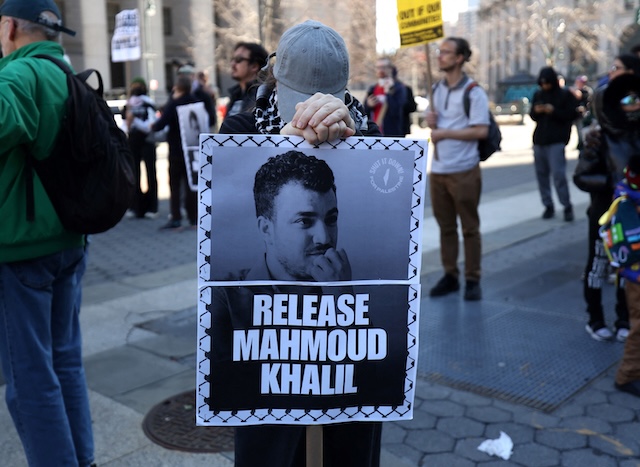Commentary: Will screening immigrants’ social media history cure antisemitism?
Published 8:13 am Thursday, April 17, 2025

- Pro-Palestinian protestors demonstrate in Lower Manhattan in New York City in March. (Timothy A. Clary/AFP/Getty Images/TNS)
Critics see a threat to free speech in last week’s announcement that the Trump administration will henceforth review the social media history of visa applicants to weed out those who have expressed antisemitic views.
No doubt the risk is there. But as with so much else that Donald Trump has done, let’s not pretend that the White House has invented some new presidential power. The exclusion of noncitizens on the basis of their opinions has been going on for over a century. This is just more of the same.
Before I say another word, let’s be clear: Antisemitism is indefensible, full stop. As a matter of history, it’s almost invariably been a prelude to anti-Jewish violence. The open expression of antisemitic views is surging in the U.S., with both right and left tolerating — even embracing — too many preachers of hate. The problem is real. The issue, as so often, is whether the administration has found the right cure.
Let’s start at the beginning. The administration’s claim of legal authority is, shall we say, not entirely unsound. Denying entry (or other immigrant benefits) because the applicant supports terrorism breaks no new ground. If we’re speaking of visa applications, there aren’t even many serious avenues for judicial review.
Federal law broadly denies admission to “any alien” who “endorses or espouses terrorist activity or persuades others to endorse or espouse terrorist activity or support a terrorist organization.” Within days of assuming office, the Trump administration put institutions of higher education on notice that it planned to use the provision to review the activities of noncitizens present in the country on student visas. Given DHS’s reference to “physical harassment of Jewish individuals”— a problem that has arisen on multiple campuses — the new plan, too, might be aimed largely at students.
Because potential entrants to the country are not generally protected by the Constitution, they have no standing to challenge a congressional enactment that bars people who’ve expressed particular sentiments. When the U.S. Supreme Court in 1972 upheld the Nixon administration’s decision to refuse entry to the Belgian Marxist Ernest Mandel, the seven-justice majority explained that as long as the executive stated “a facially legitimate and bona fide reason” for the exclusion, a court “will neither look behind the exercise of that discretion nor test it by balancing its justification against the First Amendment.”
That ruling, still good law today, broke little new ground. As the Supreme Court wrote back in 1950, “the decision to admit or to exclude an alien” may be delegated by the president to “a responsible executive officer” whose decision under the delegated authority “is final and conclusive.” Under what has come to be known as the doctrine of “consular nonreviewability” the finding by a consular official that a particular applicant for entry meets the criteria for exclusion, as long as made in good faith, is all but unreviewable.
The courts take the rule of consular nonreviewability to mean what it says. In 2024, for example, a federal judge in New Mexico relied on the doctrine in rejecting a religious freedom claim from a church that claimed its fundamental right to choose its leader was violated when its chosen pastor was denied a visa based on allegedly inaccurate information. And just last month, a federal judge in California refused to carve out an exception when the consular official who denied the visa “refused to consider” evidence that the applicant said was exculpatory. The cases go on and on.
This means that even granting the executive’s authority to exclude non-citizens who have expressed antisemitic views from the country will make any errors in interpreting what an applicant has said (or whether the applicant said it) nonreviewable.
None of this would matter if not for the risk that the administration will read the definition of antisemitism too broadly. I do not mean by this that we should adopt the narrow and artificial definitions favored by some on the left. My worry, rather, is over the risk that the administration might rework the noble crusade against antisemitism into a weapon against speech it dislikes.
All of which is to say that even were we to agree that those who espouse so malevolent an idea as hatred of Jews must be stopped at the border, one hopes that those charged with carrying out the policy will remember that where speech is concerned, the government should always regulate with care.
Stephen L. Carter is a Bloomberg Opinion columnist and a professor of law at Yale University.






